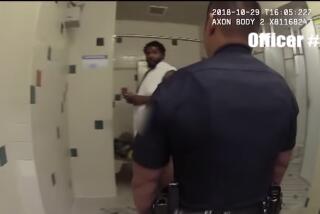Supreme Court rules against lawyer change in death row case
Reporting from Washington — The Supreme Court, ruling unanimously in the case of a convicted Orange County murderer, said Monday that death row inmates did not have a right to a last-minute switch of lawyers after years of legal wrangling.
But the court also left the door open for a change “in the interest of justice.” And the case of Kenneth Clair, the convicted murderer, may show the need for just such a change.
In 1984, Clair was a homeless man in Santa Ana who had been charged with several burglaries. He was living in a vacant house when Linda Rodgers, a next-door neighbor, was sexually assaulted and killed in her bedroom.
Clair became a prime suspect because he had been released from jail the day before the killing. And a girlfriend helped build a case against him. Several months later, she recalled seeing him on the night of the killing with blood on his hands. But no physical evidence linked Clair to the crime.
He was convicted based on strong circumstantial evidence in 1987 and sentenced to die. For nearly a quarter century, his case has been under appeal before state and federal judges.
Twenty-one years after his conviction, the state did DNA testing on the vaginal swab of the murder victim and found the test excluded Clair. DNA taken from a glove found at the scene also did not match Clair.
“This is pretty powerful evidence, and no court has looked at it yet,” said John Grele, a San Francisco lawyer who now represents Clair. He also noted that two young children who saw the killer testified at the time that he was white. Clair is black.
Clair’s claim of innocence is still pending before the U.S. 9th Circuit Court of Appeals, but the dispute before the court concerned only his plea for a new lawyer.
For years, Clair had argued his lawyers should work at investigating the crime, rather than simply trying to free him from death row. He complained to the federal judge overseeing his appeals that he wanted a new lawyer who would pursue his claim of innocence. He noted that a private investigator had found crime scene evidence that had gone untested.
In 2007, the judge refused Clair’s request for a new lawyer. He appealed and won a reversal from the 9th Circuit, which held that Clair was entitled to a new lawyer under the circumstances. State prosecutors appealed to the Supreme Court, deriding the plea for a new lawyer as “a new form of last-minute gamesmanship” by convicted murderers whose appeals had run out.
The Supreme Court handed down a split decision Monday. The court said death row inmates could seek a new lawyer if it was “in the interest of justice.” But it reversed the 9th Circuit and said Clair had waited too long to make the request.
Barry Carlton, a deputy attorney general in San Diego, said he could not comment on the DNA evidence. He and the new defense lawyer said Clair’s case would now go back to the 9th Circuit to decide on further appeals, including whether he deserved a hearing on the newly disclosed evidence.
More to Read
Sign up for Essential California
The most important California stories and recommendations in your inbox every morning.
You may occasionally receive promotional content from the Los Angeles Times.











